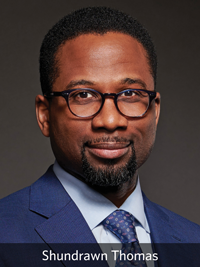The long-running discussion about the need for the wealth management industry—and the financial services industry at large—to diversify its ranks has taken on a greater sense of urgency during the past month in the wake of the protests for racial justice and equality following the deaths of George Floyd and other African Americans resulting from police actions.
Regarding financial planning, it has been well-documented that the profession predominately comprises older white males (the average age among financial advisors is somewhere in the early 50s, depending on the source).
 Shundrawn A. Thomas, President of Northern Trust Asset Management
Shundrawn A. Thomas, President of Northern Trust Asset Management
For more than 25 years I’ve worked in financial services providing investment advice and solutions to institutional investors, financial advisors and affluent families. While some may suggest it should not matter, I am African American. This perspective, combined with my professional experience and leadership role, informs my viewpoint on what we as an industry must do to translate our ideals of diversity, equity and inclusion into meaningful progress.
Let’s begin by framing the opportunity. Women account for only about a quarter of the more than 80,000 certified financial planners, while African Americans and Latinos account for less than 4%. These percentages are materially lower among all registered advisors. For a variety of reasons, our industry has failed to capitalize on the vast potential of a more diverse and inclusive workforce. While there are systemic issues that must be ameliorated, I offer several practical tactics that firms can immediately pursue in order to advance diversity, equity and inclusion.
To achieve diverse representation, firms must commit to hiring diverse professionals directly into advisor roles and leadership positions. I am keenly aware of the skills required to excel as a financial advisor, and I can unequivocally attest that there are many talented diverse individuals who can excel in these roles if provided the opportunity. Team-based structures are often most effective for ensuring the success of diverse professionals. Given industry consolidation, and that the average age of advisors is in the 50s, it is particularly timely for forward-looking firms to increase diversity. Emphasizing client-facing roles and starting at the top paradoxically provides the foundation for sustainable progress.
Equity is principally about equal access to opportunities and career advancement. To realize equity, firms must change existing talent management practices. Diverse professionals are historically less likely to be attracted to our industry and diverse communities are underserved by financial advisors. This is a lost economic opportunity for the industry—and society as a whole. Specifically, firms should develop a robust talent pipeline by partnering with organizations such as the Toigo Foundation, the Association for Latino Professionals in Finance and Accounting, and Girls Who Invest. Firms must expand recruiting by targeting Historically Black Colleges and Universities, as an example. Finally, sponsorship and mentorship must be provided for diverse professionals at each step along the employee journey.
When it comes to inclusion, here’s the best advice I can offer: intentionally diversify the client base. The lack of diversity among advisors is generally reflected in the client mix of advisor firms. Interestingly enough, U.S. wealth among women now represents a greater share than for men, with large share increases globally. Wealth among ethnic minorities is growing at a faster rate than among whites. The only way firms will become truly effective at achieving a more diverse client base will be to develop a more inclusive culture. This will in turn make inclusion a business imperative. I’m fortunate to work with a wonderfully diverse team and, together, we are putting these principles into practice to build a better future.








